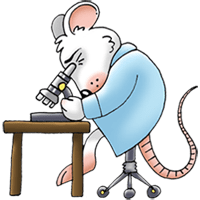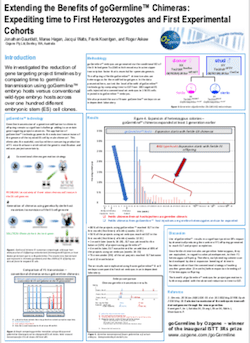Insights into cancer research
Insights into cancer research
In this issue:
– Features
– Ozgene in Indy
– Latest publications
– goGermline poster at ISTT2019
– Timeline update
 Insights into cancer research
Insights into cancer research
Many of our customers work in the field of cancer research. We would like to share two recent papers utilising Ozgene mouse models that provide insights into early mechanisms of how inflammation may promote cancer and studies on improving tumour perfusion to increase the efficacy of chemotherapy treatment.
MCC linked to inflammation and cancer
Inflammation is one of the most powerful weapons of our body’s immune system that eliminates injured cells, bacteria and irritants. While we would not be able to survive without inflammation, it is also associated with the development and progression of cancers. Chronic inflammation in combination with impaired DNA repair mechanisms can lead to pre-cancerous problems, DNA damage and cancer. Yet the early mechanisms of how inflammation promotes cancer are not fully understood.
Associate Professor Maija Kohonen-Corish has a long track record of discovery in cancer research at the Australian National University, Garvan Institute and most recently the Microbiome Research Centre (MRC) at The University of New South Wales (UNSW Sydney). Her research focuses on the genetics of colon cancer and translational research in colon and lung tumours. Her recent emphasis at MRC has been the microbiome in cancer and its impact on cancer therapies.
While at Garvan institute, A/Prof Kohonen-Corish’s team identified new tumour suppressor genes in patient tumours. They found that the expression of the MCC gene is frequently turned off through promoter methylation in colorectal cancers and that the lack of MCC is likely to promote those cancers. They identified new molecular functions for this gene in cell-cell adhesion and DNA repair, with low levels of MCC potentially leading to accumulated DNA damage and cancer.
In her recent publication, A/Prof Kohonen-Corish shows that lack of MCC does indeed promote cancer in vivo through down-regulation of DNA repair pathways. They used a Mcc knockout mouse model generated by Ozgene and induced colon inflammation in these mice. Mcc deletion caused a transcriptional defect of dozens of DNA repair genes and led to cancer development but only in the inflamed tissue. The results indicate that the loss of Mcc may promote cancer through a failure to repair inflammation-induced DNA damage. The paper provides a comprehensive set of transcriptome data for early colorectal lesions and evidence for the in vivo significance of MCC silencing in colorectal cancer.
For more information on A/Prof Kohonen-Corish and her research, read the full publication and visit her Garvan Institute website.
SOD3 increases chemotherapy efficacy
Chemotherapy is one of the most common cancer treatments. It works by circulating drugs throughout the bloodstream to treat cancer cells almost anywhere in the body. However, cancer cells undergo extreme changes that affect their microenvironment causing breakdown of the tumour vascular system, which limits the delivery of therapeutic agents.
Dr. Santos Mañes is a molecular and cellular immunologist who has dedicated a large part of his career to study immune cell function and tumour biology. Currently leading a research group in the Department of Immunology & Oncology at the Centro Nacional de Biotecnología (CNB-CSIC), he also plays a role as an expert for national and international research organisations.
Dr. Mañes and his team understand that to increase efficacy of chemotherapy treatment, the tumour vascular system needs to be normalised. They found that enhanced activity of extracellular superoxide dismutase (SOD3) induces a chain reaction of proteins that stabilises the endothelial barrier, which in return increases doxorubicin (Doxo) chemotherapy effect on tumours.
In his recent publication, Dr. Mañes identifies SOD3 upregulation as a target to improve tumour perfusion. A SOD3 ROSA26 knock-in mouse model generated by Ozgene provided enhanced SOD3 expression in endothelial cells to study the correlation between SOD3 and Doxo chemotherapeutic effects. The paper provides detailed studies on how SOD3 regulates endothelial cell structure by diminishing hyperpermeability, increasing pericyte coverage, and restoring the basement membrane, to subsequently reduce hypoxia and interstitial fluid pressure.
For more information on Dr. Mañes’s research, read the full publication.
For information on Ozgene mouse models, visit Ozgene services.
 Ozgene in Indy
Ozgene in Indy
Ozgene LLC has opened its doors in Indianapolis, IN, USA. This is part of our global strategic partnering approach to work with you every step of the way from customised mouse model development to breeding and characterisation. Contact us today to learn more.
Latest publications
Cell Mol Gastroenterol Hepatol. 2019 Mar 2. – FEATURED
Mouse Model of Mutated in Colorectal Cancer Gene Deletion Reveals Novel Pathways in Inflammation and Cancer. Currey N, Jahan Z, Caldon CE, Tran PN, Benthani F, De Lacavalerie P, Roden DL, Gloss BS, Campos C, Bean EG, Bullman A, Reibe-Pal S, Dinger ME, Febbraio MA, Clarke SJ, Dahlstrom JE, Kohonen-Corish MRJ. – Australia, Portugal. [read]
Nat Commun. 2018 Feb 8. – FEATURED
SOD3 improves the tumor response to chemotherapy by stabilizing endothelial HIF-2α. Mira E, Carmona-Rodríguez L, Pérez-Villamil B, Casas J, Fernández-Aceñero MJ, Martínez-Rey D, Martín-González P, Heras-Murillo I, Paz-Cabezas M, Tardáguila M, Oury TD, Martín-Puig S, Lacalle RA, Fabriás G, Díaz-Rubio E, Mañes S. – Spain, USA. [read]
Genesis. 2019 Apr 19.
The testicular soma of Tsc22d3 knockout mice supports spermatogenesis and germline transmission from spermatogonial stem cell lines upon transplantation. Zhou H, Zeng Z, Koentgen F, Khan M, Mombaerts P. – Germany, Australia. [read]
Proc Natl Acad Sci U S A. 2019 May 21.
Remodeling of ER-plasma membrane contact sites but not STIM1 phosphorylation inhibits Ca2+ influx in mitosis. Yu F, Hubrack SZ, ChakrabortS, Sun L, Alcantara-Adap E, Kulkarni R, Billing AM, Graumann J, Taylor CW, Machaca K. – Qatar, UK. [read]
Int J Obes (Lond). 2019 May 31.
GDF15 mediates adiposity resistance through actions on GFRAL neurons in the hindbrain AP/NTS. Tsai VW, Zhang HP, Manandhar R, Schofield P, Christ D, Lee-Ng KKM, Lebhar H, Marquis CP, Husaini Y, Brown DA, Breit SN. – Australia. [read]
PLoS One. 2019 Jun 5.
The GCN2 inhibitor IMPACT contributes to diet-induced obesity and body temperature control. Pereira CM, Filev R, Dubiela FP, Brandão BB, Queiroz CM, Ludwig RG, Hipolide D, Longo BM, Mello LE, Mori MA, Castilho BA. – Brazil. [read]
 goGermline poster at ISTT2019
goGermline poster at ISTT2019
Did you see the latest data on goGermline by Ozgene® expediting time to first heterozygotes and first experimental cohorts?
It’s pretty exciting, 88% of the projects using goGermline reached germline transmission in the first month and the rest were achieved in the following month.
If you missed it at the ISTT2019 meeting in Kobe, download the full poster on our website or get in touch to have a chat.

 Insights into cancer research
Insights into cancer research goGermline poster at ISTT2019
goGermline poster at ISTT2019



